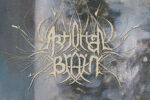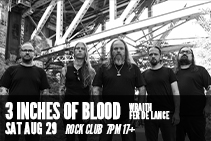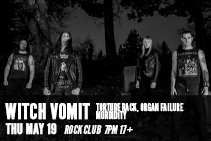

CATTLE DECAPITATION
You don’t name your band Cattle Decapitation if you’re looking to subtly insinuate your way into the consciousness of the masses. Equally, unleashing some of the most intense, horrifying, and extreme metal known to mankind will not ingratiate you with those of a sensitive nature, for the San Diegan’s boundary-pushing music is designed to turn heads and snap necks, and not necessarily in that order. Returning with their seventh full-length, the devastating Monolith Of Inhumanity, the band have never sounded more focused, more aggressive, or more determined to get in the faces of those who erroneously believe they have already experienced the band at their extreme best. “One of the main things this band has done since the very beginning was to try to break tradition and break the mold of what’s acceptable, in any given genre we’re working in,” states vocalist Travis Ryan. “I’m really happy that with this record we’ve been able to successfully push those boundaries further than we ever have, and without going into the ‘suck’ realm or sounding contrived. We’ve gone so far out on a limb on this one, and I’m just ecstatic that we’ve pulled off what we were trying to achieve.”
This achievement stands as one of the most volatile, ambitious, and impossible to aptly categorize records you will hear in 2012. Dragging their ever-evolving deathgrind sound kicking and screaming into the epic territory inhabited by the likes of Dimmu Borgir and Anaal Nathrakh, the quartet redefine all perceptions of what Cattle Decapitation is. “The mindset of this band has always been abrasive and balls to the wall, and like a car accident where there’s no fucking stopping it. Throwing melodic vocals or guitar work – or dare we say catchy elements – into that is tantalizing,” says Ryan. That such elements have been woven sparingly into their turbulent racket does not mean the band have in any way diminished the sheer visceral impact they are known for. “There can be hooks and catchiness without compromising what the band – or any individual in the band – is all about,” asserts guitarist Josh Elmore. “Having these elements at our disposal is just another tool with which we can build the best songs that we can. It was great also having input from Derek (Engemann, bass, who makes his writing and recording debut with this album), who added some new dynamics to some of the songs. We also spent a lot of time thinking about structure on this record, wanting every moment to count, no matter what the tone of it was.” After one exposure to Monolith Of Inhumanity it’s evident that these more melodic elements truly enhance the power of the tracks, and make for a more diverse and involving collection. On “A Living, Breathing Piece Of Defecating Meat” the band unleash a chorus
that manages to be hideous and infectious at the same time, while the towering “Your Disposal” and “Lifestalker” wield sweeping, dramatic sections tinged with apocalyptic fury, which are all the more gripping for the inclusion of Ryan’s melodic shrieking. “I was waiting for the guys to write parts I could use that kind of melody on, and as soon as they played me “Your Disposal” I dropped the song I was working on and just went for it,” enthuses Ryan. “This is the first record where I really listened to what the fans were saying they wanted, and many of them wanted a lot more of those weird, epic, melodic parts that crept into The Harvest Floor (2009), and I’m like okay, done, because luckily I agree with you this time!”
As with all of the band’s releases, Monolith Of Inhumanity revolves around a central concept, building upon Ryan’s potent distaste for contemporary civilization and the damage wrought in the name of progress. “Whereas The Harvest Floor focused on sort of rounding up the populace and getting rid of them, this record is about what would happen had we let them go. It’s about where humanity will end up if it continues the course it’s on,” the vocalist explains. This concept, inspired in part by 2001: A Space Odyssey, is once again captured in the cover art by longtime collaborator Wes Benscoter, depicting a bleak apocalyptic future and the regression of mankind into apes. “The monolith really represents technology, and the cover’s this trash heap with the monolith atop it and humans scavenging all around it, because that’s all they’re able to do any more. It’s where we’re headed on the course we’re on, and yeah, a lot of kids will say that’s a really negative, shitty attitude to have, but is it not correct?”
In realizing the record, the quartet – rounded out by drummer Dave McGraw – travelled to Denver, Colorado to collaborate with producer Dave Otero (Allegaeon, Cephalic Carnage). “Dave brought really good performances out of everybody, and he gave the record a lot of clarity while the heaviness is still there,” states Elmore, though it was the producer’s suggestions on how to better flesh out the songs that made the most profound difference in the guitarist’s eyes. “The guy really knows what he’s doing. I do a lot of layering after the basic rhythm track, and if I came to a point where I wasn’t sure about something someone would always pipe up and say you realize everything Dave has suggested so far has worked? Try it!” he laughs. That the record is as accomplished as it is also belies the fact that the schedules of the members made it difficult for them to focus on writing it over the year they had allotted. “As it turns out we work really well under pressure,” Ryan says with a wry smile. “But we were all so busy it’s literally a wonder that we got it done at all in that year, let alone what we came out with. It makes me feel like we’re capable of anything, and that’s really a new development.”
The visual aspect of their output having always been important to them, the band are enthused to have the album released as a gatefold vinyl, and to have Tom Bunk, creator of The Garbage Pail Kids collectors cards from the 1980s, design cards for the individual members of the band, which will be available with pre-orders. “Collecting those cards was one of my favorite things when I was a kid, and our friend and ex-manager is a complete nerd about it and has known Tom Bunk for years, and put us in touch with him. This is an older guy that doesn’t have to be fucking around with some deathgrind band who isn’t going to push him to new heights, but he thought it sounded like a fun project and he was very cool about everything. It still hasn’t really hit me that we quite literally have our own Garbage Pail Kid cards!” Ryan grins. “The funny thing is that it also inadvertently ties right into the theme of the record, which has so much focus on garbage and waste. It didn’t even occur to me until months later, but that’s the beauty of this band, things happen for a reason. For instance, for the first time, going into this record I didn’t have the whole concept worked out in my head. Usually I have it in mind as much as a few years before we get around to making the record, and I need that, it has to make sense to me or it’s just not going to work. I was so scared it just wasn’t going to come, but one day it literally just hit me. The title, the concept, the cover, all of it, and suddenly everything fell into place, and now it’s done I think this is the first time we’ve all been one hundred percent proud of what we’ve created – and for good reason.”
Bio by Dan Slessor

REVOCATION
Revocation creates extreme music for extreme times. On New Gods, New Masters, their fifth record for Metal Blade, the quartet–spearheaded by founder/vocalist/guitarist Dave Davidson–delivers nine potent and portentous songs of brutal lyrical and musical significance.
Produced by Davidson mixed and mastered by Jens Bogren (The Haunted, Spiritbox), tracks including “Cronenberged” (feat. Jonny Davy of Job for a Cowboy), “Sarcophagi of the Soul,” “Confines of Infinity” (feat. Travis Ryan of Cattle Decapitation) and “Dystopian Vermin” thematically explore AI and its impact on humanity.
“I’ve been very fascinated with the development of Artificial Intelligence, and I’m deeply concerned where this could lead humanity,” says Davidson, “whether it’s the slow march towards a technological dystopia or the all-out annihilation of our species.”
To wit, “Cronenberged” is about a science experiment gone wrong. Davidson is a massive Sci-Fi horror fan who loves the body horror genre that David Cronenberg helped create; the song is an homage to that. And, Davidson adds, “Shout out to Rick and Morty for inspiring the song title.”
The Boston-bred Davidson credits newest members Harry Lannon (rhythm guitar and backing vocals since 2023) and bassist Alex Weber with a renewed energy and intensity onstage. “It’s been a pleasure ripping with those guys alongside Ash (Pearson), who always crushes it behind the kit.” In terms of his playing, writing, and singing, “I’m always refining my craft and trying to get better,” he says.
Davidson was excited to welcome a guitar guest—as well as impressive vocal features—on New Gods, New Masters. Revocation had late Black Dahlia Murder singer Trevor Strnad and Corpsegrinder of Cannibal Corpse guesting on Netherheaven, and Davidson recruited more talented peers for New Gods. “I’m honored to have such amazing guests on New Gods. On vocals we have Jonny Davy and Luc Lemay, two vocalists that I really admire who have their own unique sound,” says Davidson. “I remember texting with Jonny about guesting on “Cronenberged” asking him if we wanted to be the personification of a mutated abomination that escapes a testing facility. He was stoked to go as unhinged as possible and his vocals on that track sound truly inhuman.”
A longtime fan of Gorguts’ Lemay, describing the Canadian singer’s vocals as “brutal but also tortured sounding at times. There’s a lot of emotion in his voice and that came through perfectly on the album closer ‘Buried Epoch.’” Slightly more unexpected is the contribution of jazz player Gilad Hekselman, who played with Pat Metheny at The Kennedy Center and won Rising Star in Downbeat Magazine, among numerous other accolades. He plays on “The All Seeing.” “Gilad is a buddy of mine and happens to be one of the best jazz guitarists in the world. His playing is awe-inspiring, and I’m truly honored to have him as the guest soloist on the outro of ‘The All Seeing.’”
New Gods, New Masters marks the band’s 20th anniversary. Revocation debuted with 2008’s Empire of the Obscene and subsequently released seven critically acclaimed albums and toured over 25 countries, bringing their technically charged, high-energy extreme metal to North America, Europe, and Asia-Pacific. New Gods follows up 2022’s Netherheaven, where Davidson’s lyrics took hard looks at Catholicism, hypocrisy, politics, the occult and demonic symbolism. Critics raved about Netherheaven, calling it “ Revocation’s best record in a decade” and praising the “darkest, heaviest songs of their career.”
That album set a high bar, but an even sharper musical and lyrical focus was achieved on New Gods, New Masters, which is deftly captured in the album artwork by Paolo Girardi. “He did an incredible job of bringing the lyrical themes of a bleak techno-nightmare to life,” Davidson says. “The ‘New God’ being birthed from the abyss of teeth and wires was even better than what I envisioned. I absolutely love the color palette he used. He even included some easter eggs from our first demo and first full-length album cover, which adds even more depth and meaning to the artwork for me.”
Titling the album New Gods, New Masters reflects his belief about humans’ need to worship various gods. “It seems as if that desire is encoded in our DNA. As science and our understanding of nature and the universe as a whole, increases, the religions of the old gods start to become obsolete,” believes Davidson. “However, I believe we’ve replaced our old gods with new ones, worshipping technology and creating a cult-like idolatry of innovators.”
Revocation, unafraid to upend musical and lyrical tropes with forward-thinking and sounding approach, with songs that excoriate society’s addiction to phones (‘Sarcophagi of the Soul”) and animal experiments that illuminate/replicate societal issues (“Dystopian Vermin”), Davidson’s science-backed observations all the more terrifying for their reality.
If technological advances create worse problems alongside “solutions,” Revocation forge ahead, four guys plugged in, fighting existential threats with metal, “waiting to see what the next trial of the human experiment brings.”
Music grounds and uplifts the band members—and fans. “I’m proud that I’ve been able to evolve as a musician and songwriter with every release. I never want to stagnate, and I think we’ve achieved real growth with every album,” says Davidson. “I’m also extremely proud that I’ve been able to keep this band going after all these years; it’s crazy to think of how far we’ve since the beginning.”
Lineup:
Dave Davidson: Vocals, Guitar
Ash Pearson: Drums
Harry Lannon: Rhythm Guitar
Alex Weber: Bass

FULL OF HELL
On tour forever. Numb your mind.

ARTIFICIAL BRAIN
Artificial Brain are a technical death metal quintet from Long Island, New York. Their core sound weds pummeling tech and death metal to the buzzing edges and Phrygian mode scales of black metal with an angular, dissonant edge and nearly subliminal growling vocals using science fiction themes as lyric inspiration. The self-released, three-track Demo 2011 presented the band with opportunities for regional touring while 2013’s Butchering Cosmic Giants EP won notice globally, netting them a record deal with Profound Lore. 2014’s long-playing debut, Labyrinth Constellation, was produced, mixed, and mastered by Colin Marston; it scored dozens of positive reviews for its bracing modern approach to death metal. 2017’s Infrared Horizon proved more experimental and wide-ranging, resulting in a prime slot on Cattle Decapitation’s tour. Founding vocalist Will Smith left the band in September 2021. He was replaced by vocalist Paulo Paguntalan for immediate touring, though Smith’s voice had already been recorded for material on 2022’s Artificial Brain. ~ Thom Jurek, Rovi
















